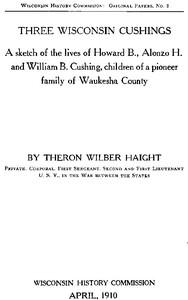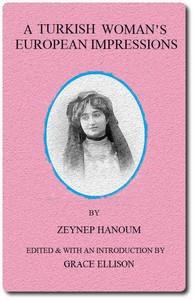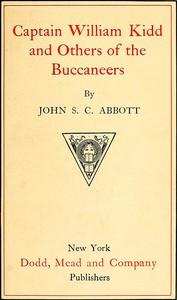Read this ebook for free! No credit card needed, absolutely nothing to pay.
Words: 23272 in 9 pages
This is an ebook sharing website. You can read the uploaded ebooks for free here. No credit cards needed, nothing to pay. If you want to own a digital copy of the ebook, or want to read offline with your favorite ebook-reader, then you can choose to buy and download the ebook.


: Three Wisconsin Cushings A sketch of the lives of Howard B. Alonzo H. and William B. Cushing children of a pioneer family of Waukesha County by Haight Theron Wilber - United States History Civil War 1861-1865 Biography; Cushing Howard Bass -1871; Cushing
April 13, 1843. It may be pretty safely assumed that he became aware at about that time of the inroads of a disease in his own system which some four years later proved fatal.
In 1844, then, it is probable that the wife and mother left the little town that she had learned to love so well, and wended her way to Chicago with her own children and those of her husband's former marriage. It is said that she had suggested the name of Delafield for the township, because the Nemahbin lakes were not within its boundaries. The change in designation was made by the legislature in 1843. During all the time of the residence of the family here, they lived in Milwaukee County, in the Territory of Wisconsin. Waukesha County had not yet been accorded a separate civic organization, and Wisconsin did not become a state until 1848. Mrs. Cushing's choice for the name of the place was stated by her to have been influenced by what she considered the more euphonious sound of the name adopted, when compared with the family name that was to be immortalized and made resplendent by her three sons born in Wisconsin. It is a pity that the town had not been called Cushing, for Mr. Delafield died soon afterwards, and the mill property was sold with the rest of the estate of the deceased in 1846, since which date there has been nothing of an historical character to remind one of the origin of the local name.
There is no available information of the events of the three years ending with 1847 and relating to the Cushing family in Chicago--a town not then as satisfactory from an aesthetic view-point as the Milwaukee they had left in 1839. Perhaps an exception should be made to this statement of lack of information, in favor of an anecdote told by Mrs. Edwards of the young William walking off into Lake Michigan, and informing his rescuer that his name was "Bill Coon," so that he could not be immediately identified. He consequently was lost to his family for the succeeding thirty-six hours. It is also mentioned incidentally that Dr. Cushing resumed the practice of medicine at Chicago, but he could hardly have attained much success in it, on account of his declining health. Early in 1847 he returned to Ohio, perhaps arranging there for the future of the two sons by his first marriage, one of whom became a lawyer and partner of Salmon P. Chase, and the other a physician; but both died several years before the outbreak of the war.
Dr. Cushing himself died at Gallipolis, Ohio, on April 22, 1847. He must have been a man of considerable force of character, and of great personal attractiveness, as well as of correct conceptions of right and wrong, with sympathies always for the right side of public questions. His physical constitution was not robust, however, and he therefore passed away without leaving any memory of important action of his own, and without provision for his widow and her children.
It is at this point that Mrs. Cushing's personality becomes more distinctly visible to the investigator of the family annals. Having to lay out a course of life with particular reference to the welfare of her little ones, she wisely decided, like Ruth in the ancient story, to go back to the home of her husband's relatives, and there to begin life anew. She loved her independence and had no intention of quartering herself upon the charity of those well-disposed people; but it was reasonable to hope that they, or some of them, would take sufficient interest in the boys, at any rate, to point out ways and means for their development into good citizens, and opportunities of which they might take advantage to win places of honor and usefulness among their fellow men.
She was very soon enabled to establish a school for children at Fredonia, by means of which, with the practice of strict economy, she maintained her family in a respectable manner. The indulgence of social vanities was of course not within the scope of her plans. Her boys were required to help in the support of the family by the performance of such slight tasks as the neighbors called upon them to accomplish--driving cows to pasture, and other "chores" of a similar character. All moneys earned by this work were handed over to the mother and employed to the common advantage of the family. Mrs. Bouton, of Chicago, the youngest of the children, and the only one now surviving, writes this, of her early life at home:
One trait, I think, was very remarkable in our family--the respect and courtesy manifested toward each other. I never received a reproof or heard an impatient word from either of my brothers. They always displayed toward each other and my mother and myself, the same courtesy they would show to a commanding officer. The petting and love I received was enough to have spoiled me for life for contact with the world.
In the case of William, at least, the spirit of courtesy would not appear to have been so overwhelming as to prevent an occasional exuberance of spirits, an instance of which is told of in a letter from Mrs. Julia G. Horton of Buffalo, cited by Mrs. Edwards as follows:
Will was never happier than when playing some joke upon one of his elder brothers. One summer evening I accompanied his brother Alonzo "to the mill-pond," upon his invitation to take a row in a forlorn old scow which was much patronized by the young people for what they considered delightful trips over the smooth pond. When we reached the bank we found that some one had untied the boat and set it adrift. No other boat was to be had and so we sat down on a log, wondering if some one had tricked us out of our row. Soon we heard a wild whoop in the distance and saw Master Will waving an oar and shouting to us: "Next time you want to row, don't forget to ask your friends."
Mrs. Horton also tells an anecdote of how the future commander followed her and one of his brothers to a prayer-meeting, seating himself behind them and singing improvised personalities instead of the approved words of the hymns that were being sung by the worshippers, so that he was discovered by a church official and led out of the congregation in disgrace. There are other like narratives surviving among the relatives and acquaintances of the Cushings, but none of them throw additional light upon the young men in whom we are at this time most interested. With Milton, the eldest, tradition has not seemed to busy itself. He was not a native of Wisconsin; and it may be enough to say here that in due time he became a paymaster in the Union navy, receiving promotion, until he was retired for disability, as paymaster of the fleet then in the Mediterranean, and died January 1, 1886. He married, but left no issue.
In the meantime, Alonzo was bravely attending to such home duties as would be valuable in lightening his mother's work.
In 1855 her brother-in-law, Francis S. Edwards, took his seat as member of Congress from the Thirty-fourth New York district, and the next year procured the appointment of William as a page on the floor of the House.
Free books android app tbrJar TBR JAR Read Free books online gutenberg
More posts by @FreeBooks

: A Turkish Woman's European Impressions by Zeyneb Hanoum Ellison Grace Editor Rodin Auguste Illustrator - Turkey Social life and customs; Europe Social life and customs; Women Turkey








